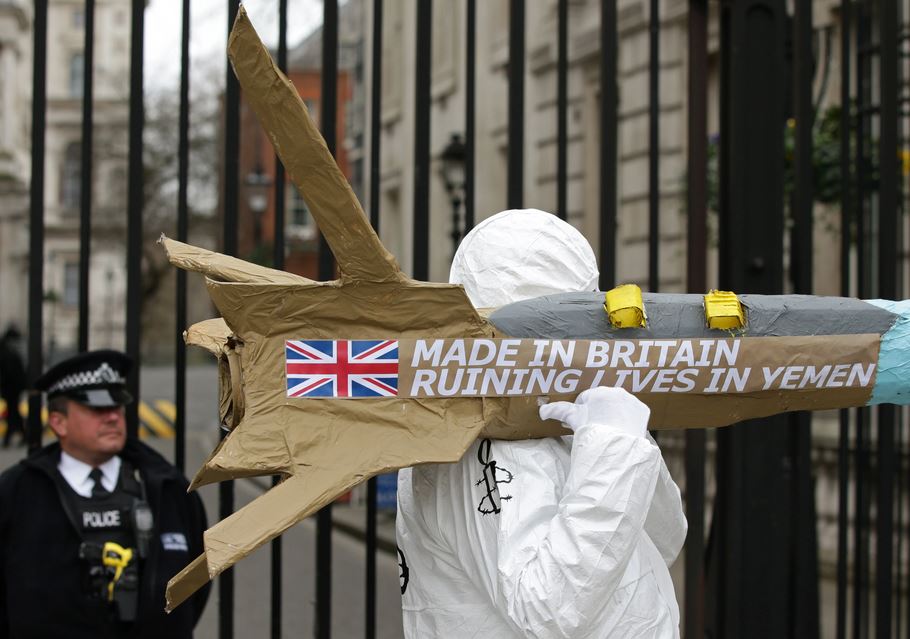AhlulBayt News Agency (ABNA): In the six years of the illegal war of the Saudi-led Arab coalition against Yemen, the arms sales to the aggression countries have been the driving force behind the continuation of the campaign and the Riyadh show of unwillingness to end its attacks on the civilians and infrastructure. Rights organizations and activists have been critical of the West’s hypocrisy and equivocality as the Western countries on the one hand talk about the need to end the war and on the other hand maintain arms sales to the Saudis and their ally the UAE.
Joe Biden has recently violated his campaign-time promises of ceasing arms sales to Saudi Arabia, which came in response to rights groups’ criticism, and approved weapons exports to the Arab kingdom in the first publicized deal since he assumed the power last year. The Pentagon announced that the White House approved worth of $650 million air-to-air missiles to the oil-wealthy kingdom. The deal will see delivery of 280 missiles and about 600 launching pads and related facilities.
While it is clear to all that without the support of Washington, Saudi Arabia would not have been able to start and continue the war against Yemen, in recent months the US State Department's actions have been centering on bringing Riyadh to the negotiating table. But should the deal be taken as a drastic shift of Washington to Yemen war? Can these weapons tip the scales on the battleground in favor of the Saudis?
Biden Yemen war policy’s key components
There is a set of defining components to the US President Joe Biden’s policy on Yemen that need to be considered in analyzing his recent review of policy and decision to sell more weapons to Saudi Arabia.
One of the main components effecting Biden’s decision for new arms delivery is Washington’s efforts to assure Riyadh and its other regional allies about the American commitment to protection of the security and interests in maintaining the strategic relations. Undoubtedly, the US military withdrawal from Afghanistan along with the growing analyses of the declining importance of the West Asia as a center of focus of the US foreign policy over the past few decades, as well as Biden's desire to revive the nuclear deal with Iran and the Saudi concerns about possible lifting of anti-Iranian sanctions have sent the Saudi rulers worried about their security interests. Albeit, it was proven to the Saudis under Donald Trump presidency in the US, and especially with the American inaction to unprecedented 2018 attacks on Saudi oil giant Aramco, that the period of utter reliance on Washington for security has gone.
Now that the Saudis are more helpless and frustrated than in the past six years in the face of Yemeni retaliatory attacks, and Ansarullah movement’s advances on the Ma'rib front are leading to the complete destruction of Saudi reasons for start of war, the arms sale announcement is a step for Saudi morale boost and sends a message to Sana’a about the need to stop progress in Ma’rib battle.
Over the past year, human rights cases and the Yemeni war have seemingly been two main topics in Riyadh-Washington negotiations. But the reality is that a much more decisive variable swaying the US policy is the lobbying of the arms manufacturers. Yemen war has been a lucrative source of revenues for the US arms companies over the past 6 years.
On Friday, CNN, citing Stockholm International Peace Research Instituter (SIPRI), reported that arms contracts with the US over the past 5 yeast make Saudi Arabia the top American arms buyer. The report adds that 24 percent of the US-produced arms were exported to Saudi Arabia. After the US with 79 percent of arms imports to Saudi Arabia comes Britain with 9.3 percent and France with 4 percent. The US arms exports from 2011 to 2020 grew 15 percent, giving Washington 37 percent of the arms market share, up from 32 percent. According to the report, around half of the US arms exports, around 47 percent, from 2016 to 2020 have been to West Asia, meaning that they grew 28 percent compared to 2011 to 2015.
Inability to protect Saudi Arabia amid shifting war equations
In understanding the influence of the arms deal with Saudi Arabia, the reality about its goals being political and the inability of such supports to substantially change the field equations or even force Sana’a away from exerting sovereignty and chasing the goal of expelling the occupying forces, Al-Qaeda, and ISIS terrorists from Ma’rib are apparently obvious.
Firstly, past military support for Saudi Arabia has been far stronger and more sophisticated to the degree that among the conventional weaponry available in the arms markets and even the strategic systems, like the Patriot air defenses, which the US gives to its closest allies, Riyadh already has all.
Secondly, the new bombs sold to Riyadh are only used in air wars, while Yemen’s main power is in the ground battles and the Saudi air power has had the least influence in stopping Ansarullah’s advances on the ground. With this in mind, it can be said that the struggle of the largely-broken Saudi-led coalition and its Western backers to stop Ansarullah’s push to capture Ma’rib looks quite of no vail, and soon control of the strategic province will deal them a fatal blow.
/129
source : Al Waght News
Tuesday
9 November 2021
6:13:55 AM
1196929

In the six years of the illegal war of the Saudi-led Arab coalition against Yemen, the arms sales to the aggression countries have been the driving force behind the continuation of the campaign and the Riyadh show of unwillingness to end its attacks on the civilians and infrastructure. Rights organizations and activists have been critical of the West’s hypocrisy ...
